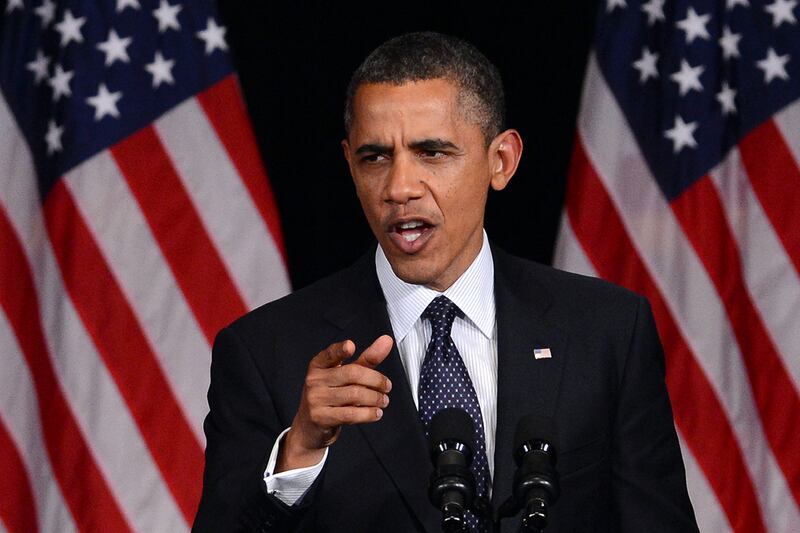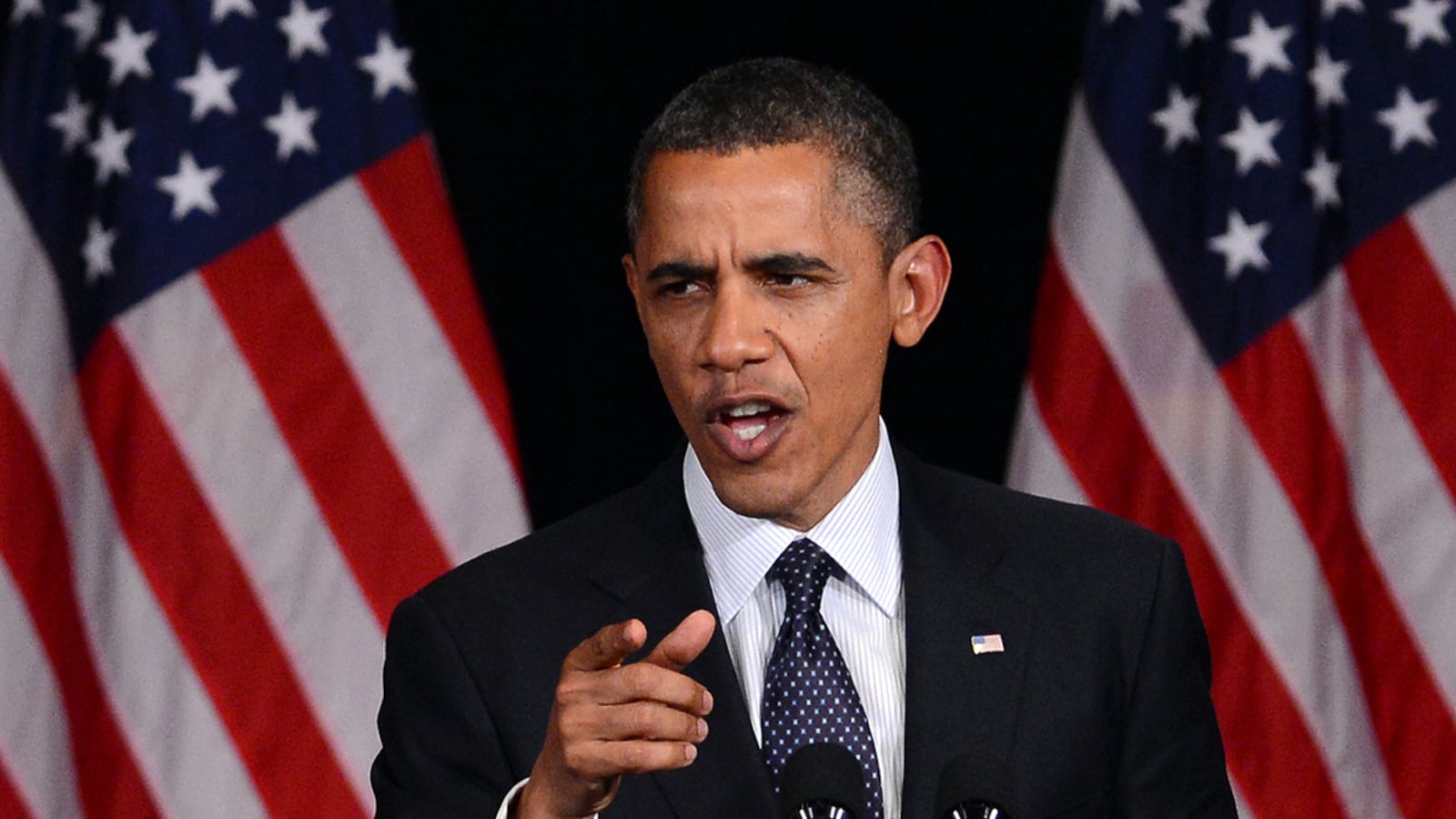Perhaps you heard that the other day Barack Obama expressed the view that if he wins reelection, the Republicans will calm down a bit: “I believe that if we’re successful in this election—when we’re successful in this election— that the fever may break, because there’s a tradition in the Republican Party of more common sense than that. My hope and my expectation is that after the election, now that it turns out the goal of beating Obama doesn’t make much sense because I’m not running again, that we can start getting some cooperation again.” Now, there are any number of reasons he might have felt he had to say that. But I pray that he doesn’t actually believe it, because if he does, then he’s completely delusional—to an extent that will result in very bad policy capitulations. There’s really only one way that the GOP’s fever will break, and it will take years.

First, the immediate situation. Say Obama is reelected. Say that it happens, as it almost certainly would, with him receiving fewer electoral votes and real votes (i.e., winning by a narrower margin) than last time. The Republican Party is going to react to this with resignation? Right. Washington Republicans will do what they always do, which is to say, they will do what their base instructs them to do. And their base will be apeshit if Obama wins again. The first imperative will be to oppose and destroy him on Taxmaggedon (the confluence of Bush tax cuts expiring and deep budget cuts kicking in come January). The longer-term project will be to find any flimsy grounds for impeaching him. The decibel level of all this at Fox and the usual redoubts will be deafening. Obama will get nothing from Congress—forget legislation. I mean not a judge, not a Fed appointment. Nothing.
I can see why he might not want to say this publicly, to be seen as the one still trying, and to give his voters some hope that things can improve. But I fear that he still believes it—believes in that idea of himself as conciliator. And that belief could have consequences. In negotiations about, say, entitlements, he’ll give the Republicans more than he’ll get—he’ll have to, because his standing and legacy will be at risk. He’ll need a deal far more than Republicans will. If he walks into next year’s negotiations thinking, Charlie Brown-style, that this time Lucy really will hold the football down there, he will be forced into deals even more terrible than otherwise.
Obama needs to understand that Republican hatred of Obama isn’t only about Obama. True, he’s a freak as far as right-wingers are concerned. But he’s more than that. He’s a freak who, at a time of great anxiety and unrest, wants to take their money and give it to other freaks—the black, the foreign-born, the underwater mortgagees. So he represents an America they despise.
Did I say despise? Yes, and I meant it. You may have seen the recent Pew study on polarization. The Democratic Party has moved modestly to the left since 1987, it found—chiefly on social issues, not on fiscal ones. If anything, fiscally it’s moved a hair to the right—no one would ever entertain, for example, the top marginal tax rate being as high as most Democrats thought it should be back then. But the Republican Party has shot like a cannonball to the right. A quarter-century ago, 62 percent of Republicans thought government should help poor or struggling people. Now, just 40 percent do. And even that 40 percent is about 39 percent higher than you’d get if you surveyed Republicans in Congress.
No, there’s no breaking this fever. In a rational world, Obama might have been correct. But that's not the world we're living in. So what will break the fever? It’s been 20 years in the making, and alas it’ll probably be another 20 years in the unmaking. But there’s only one thing I can think of: more moderate Republicans.
That is to say, what this country needs, as I argue in the current New York Review of Books, is a large and well-funded and well-run organization to advance moderate Republicanism and elect moderate Republicans. Politicians only really respond to one stimulus: The fear that they might lose the next election. Republicans behave the way they behave because every incentive they have rewards it. They are loony-right obstructionists because it pays to be that in terms of contributions and votes. But if, somehow, Republicans came to fear that being on the loony right and obstructing everything a president from the other party did could lead to defeat, then and only then would things change.
The presence of more truly moderate Republicans would, completely by itself, fix most of our government’s problems. Imagine, for example, that there were 12 or 15 actual Republican moderates in the Senate, instead of the three who are in fact there (I’m counting Olympia Snowe, Scott Brown, and Mark Kirk; Susan Collins’s voting record is pretty conservative, look it up).
What would happen? Three moderates can’t do anything. But 12 or 15 can—they’d constitute a bloc, and they’d have leverage. And we would have compromise, and we’d have deals. Grover Norquist wouldn’t be a player, with his anti-tax pledge. True moderates wouldn’t sign that nonsense. So this bloc would agree, as Ronald Reagan did several times, to modest tax increases provided they got something in return. Which they would, because the Democratic caucus is already heterogeneous enough to be amenable to compromise.
It really is this simple. All this hand-wringing about our civic institutions and procedural reform and blah blah blah. Forget it. Politicians don’t respond to that stuff. They respond to votes. If there were moderates voting in large numbers in the GOP, putting moderate politicians in office, our polarization problem would be largely solved.
All you geniuses who sunk all that money into Americans Elect, I’m talking to you. We don’t need a centrist party or presidential ticket. We simply need more moderate Republicans. Put your millions into the Ripon Society, or something like it designed to build a moderate voting base within the GOP. If you want to end polarization, you must solve the problem that exists, not some fairy-tale problem. And the problem that exists is the ideological extremism and homogeneity of the Republican Party.
This is of course a big job. It’ll take 20 years. But that’s how the fever will break. I think, anyway. At the very least, I can assure you that it won’t break because Republicans decide in 2013 that Obama won fair and square and they might as well get used to him.






